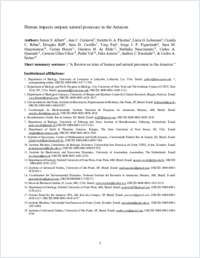Human impacts outpace natural processes in the Amazon
DOKPE
- Albert, James S. ORCID University of Louisiana at Lafayette
- Carnaval, Ana C. ORCID City University of New York (CUNY) and CUNY Graduate Center
- Flantua, Suzette G. A. ORCID University of Bergen and Bjerknes Centre for Climate Research
- Lohmann, Lúcia G. ORCID Universidade de São Paulo, SP, Brazil
- Ribas, Camila C. ORCID Instituto Nacional de Pesquisas da Amazônia, Manaus, AM, Brazil
- Riff, Douglas ORCID Universidade Federal de Uberlândia, Minas Gerais, Brazil
- Carrillo, Juan D. ORCID University of Fribourg
- Fan, Ying ORCID The State University of New Jersey, NJ, USA
- Figueiredo, Jorge J.P. ORCID Universidade Federal Rio de Janeiro, RJ, Brazil
- Guayasamin, Juan M. ORCID Universidad San Francisco de Quito USFQ, Quito, Ecuador
- Hoorn, Carina ORCID University of Amsterdam
- Melo, Gustavo H. de ORCID Department of Geology, Federal University of Ouro Preto, MG, Brazil.
- Nascimento, Nathália ORCID University of São Paulo, SP, Brazil
- Quesada, Carlos A. ORCID Coordination for Environmental Dynamics, National Institute for Research in Amazonia, Manaus, AM, Brazil
- Ulloa Ulloa, Carmen ORCID Missouri Botanical Garden, St. Louis, MO, USA
- Val, Pedro ORCID School of Earth and Environmental Sciences, Queens College, CUNY, New York, NY, USA
- Arieira, Julia ORCID Science Panel for the Amazon (SPA)
- Encalada, Andrea C. ORCID Universidad San Francisco de Quito
- Nobre, Carlos A. ORCID University of São Paulo, SP, Brazil
- 27.01.2023
Published in:
- Science AAAS. - New York : American Association for the Advancement of Science, 2023. - 2023, no. 379
English
Amazonian environments are being degraded by modern industrial and agricultural activities at a pace far above anything previously known, imperiling its vast biodiversity reserves and globally important ecosystem services. The most substantial threats come from regional deforestation due to export market demands, and global climate change. The Amazon is currently perched to transition rapidly from a largely forested to a non-forested landscape. These changes are happening much too rapidly for Amazonian species, peoples, and ecosystems to respond adaptively. Policies to prevent the worst outcomes are known and must be enacted immediately. We now need political will and leadership to act on this information. To fail the Amazon is to fail the biosphere, and we to fail to act at our peril.
- Faculty
- Faculté des sciences et de médecine
- Department
- Département de Biologie
- Language
-
- English
- Classification
- Biological sciences
- License
-
License undefined
- Open access status
- green
- Identifiers
- Persistent URL
- https://folia.unifr.ch/unifr/documents/324730
Statistics
Document views: 134
File downloads:
- Albert et al. 2023 Science.pdf: 548
